Further commitments have been announced by major airlines in Europe and the US for sustainable aviation fuel, collectively totalling around 550 million gallons. Air France-KLM has signed an MoU with its long-term fuel supplier TotalEnergies for up to 800,000 tonnes of SAF, or 264 million gallons, for its group of airlines, while low-cost European carrier Ryanair has partnered with Shell for another 360,000 tonnes, or 120 million gallons, and US operator JetBlue will take at least 92 million gallons of blended product from Fidelis New Energy. The three deals add to other significant offtake agreements this year by each of the airline groups as they ramp up their decarbonisation activities. Meanwhile, Virgin Atlantic is to purchase 70 million gallons of SAF over seven years as part of a new agreement with joint venture partner Delta Air Lines. The fuel, which will be produced by Gevo, will be used on flights from the US West Coast.
The Air France-KLM agreement with TotalEnergies, a strategic partner since 2014, specifies the supply of 800,000 tonnes of SAF over 10 years, with deliveries commencing in 2023. The fuel will be used by Air France, KLM and Transavia largely for flights departing from French airports, in line with national SAF blending requirements, as well as from the Netherlands. The fuel will also comply with the airline group’s policy that any SAF it procures must not compete with human food or animal feed, that it not be derived from palm oil and that it be certified as compliant.
As of earlier this year, KLM flights from Amsterdam Schiphol have been operating with a minimum of 0.5% SAF in their jet fuel and the French government has introduced a 1% SAF mandate on flights from French airports, a level that is expected to rise to 2% in 2025 and 5% in 2030 in line with proposed EU regulation. Crop-based fuels have been excluded from use in the French mandate.
“Air France-KLM is fully committed to advancing SAF production in Europe and around the world,” said CEO Benjamin Smith. “This MoU with TotalEnergies is another building block to further the development of a French SAF industry that can meet the airlines’ needs. This therefore marks a fundamental milestone in the successful decarbonisation of our business. We are continuing to step up our efforts to reduce the impact of our operations as quickly as possible.”
TotalEnergies is targeting 1.5 million tonnes of SAF production by 2030 using waste and residues including used cooking oil, animal fats and synthetic fuels. “This new partnership with Air France-KLM exemplifies the excellence of industry and French aerospace in committing to a more sustainable aviation sector,” said its CEO Patrick Pouyanné, adding biofuel development was a company priority. “By directly reducing the carbon intensity of the energy products used by our air transport customers, we are actively working with them to achieve net zero emissions by 2050, together with society.”
In recent initiatives, Air France-KLM group airlines have operated a range of flights using between 16% and 30% SAF sourced from TotalEnergies.
The latest SAF deal coincides with confirmation that under the group’s scope 1 and 3 emissions reduction targets, Air France Group and KLM have been assessed and validated under the Science Based Targets initiative (SBTi) as aligning with the ‘well-below 2 degrees Celsius’ objective determined as part of the 2015 Paris Agreement on climate. The strategy is primarily centred on reducing direct and indirect CO2 emissions by 30% per passenger/km by 2030 compared to 2019.
In another European partnership, low-cost carrier Ryanair has signed an MoU with global energy company Shell for the supply of SAF to more than 200 airports across Europe, in particular the airline’s biggest bases in Dublin and London Stansted.
Through this deal, the airline expects to access up to 360,000 tonnes, or 120 million gallons, of SAF between 2025 and 2030, with the fuels produced via multiple technology pathways and using a range of sustainable feedstocks. It estimates that using this amount of SAF would reduce CO2 emissions from its flights by more than 900,000 tonnes, equivalent to the output of over 70,000 Dublin-Milan services.
“SAF plays a key role in our Pathway to Net Zero strategy, and also our commitment to a target of 12.5% SAF by 2030,” said Thomas Fowler, Ryanair’s Sustainability Director. The agreement with Shell would enable the airline to procure around 20% of the SAF needed to meet this target, he said, while progressing its aggressive growth strategy, which estimates that passenger volumes will reach 168 million in FY2023, en-route to a target of 225 million per year by FY2026.
Jan Toschka, President of Shell Aviation, said their agreement demonstrated that both companies viewed SAF as the key to net zero aviation emissions. “It is fantastic to build on our existing relationship with Ryanair to now look at what we can achieve together on sustainability,” he said. “Leadership and bold actions are needed to accelerate the decarbonisation of flight.”
In the US, JetBlue and Fidelis New Energy (FNE) have signed an MoU on SAF, through which the airline will source at least 92 million gallons of blended product over a five-year term from 2025. The fuel will be designed to achieve negative lifecycle carbon intensity by integrating carbon capture and sequestration (CCS) and biomass energy with CCS (BECCS). The SAF will be produced at FNE’s Gron Fuels GigaSystem at the Port of Baton Rouge, Louisiana, which the company estimates will produce 1 billion gallons per year of SAF, renewable diesel and other low carbon products. The new plant will also use waste process heat to generate power, producing biogas from by-products and using flexible processing methods to produce carbon-negative SAF from existing and emerging feedstocks.
Although JetBlue is already a regular user of SAF, it accounts for less than 1% of the airline’s total fuel usage. “We need significantly more supply to reach our 2040 net zero target,” said Sara Bogdan, JetBlue’s Director of Sustainability and ESG. “With partners like Fidelis and their carbon negative Gron Fuels Gigasystem, we are not only supplying our own growing SAF needs, we’re sending a powerful signal that significant demand for SAF exists. By introducing negative carbon intensity SAF to our network, we are also taking steps towards reaching true carbon neutrality as an airline.”
In addition to producing carbon negative SAF, Fidelis Co-founder and COO Bengt Jarlsjo said his company’s high-capacity carbon sink was expected to permanently sequester some 5 million tons of biogenic CO2 per year from the Louisiana facility.
JetBlue has also had a science-based, Paris-aligned climate target to reduce jet fuel emissions approved by the SBTi. The airline commits to reducing well-to-wake scope 1 and 3 GHG emissions by 50% per revenue tonne kilometre (RTK) by 2035 from a 2019 base year, with a goal of reaching net zero carbon emissions by 2040, 10 years ahead of the sector’s target. The airline said SAF is expected to be the key contributor to large-scale lifecycle emissions reduction, although it is highly dependent on availability and costs of supply.
Virgin Atlantic Airways has announced a 70 million gallon commitment to SAF with its 49% shareholder Delta Air Lines, and to be produced by Gevo. The fuel will be supplied by Delta to Virgin Atlantic at a rate of 10 million US gallons per year over seven years at either Los Angeles or San Francisco airports. It will represent 20% of Virgin Atlantic’s commitment to 10% SAF use by 2030 and equate to around 500 trans-Atlantic flights from Los Angeles.
The parties have not disclosed a start date for deliveries of SAF, which will come from one of Gevo’s future production facilities. Gevo separates sugars and proteins from sustainably farmed non-edible industrial corn, with the sugars then used to produce SAF and the proteins fed to livestock, whose manure can then be processed to develop renewable natural gas and agricultural fertiliser.
“We know that SAF has a fundamental role to play in aviation decarbonisation,” said Holly Boyd Boland, VP Corporate Development at Virgin Atlantic. “The demand from airlines is clear and Virgin Atlantic is committed to supporting the scale up of SAF production at pace. We cannot meet our collective ambition of Net Zero 2050 without it.”
In March this year, Delta signed an agreement with Gevo valued at around $2.8 billion to purchase 75 million gallons per year over seven years, subject to Gevo developing, financing and constructing one or more production facilities to fulfil the quantity.
Image: Air France-KLM


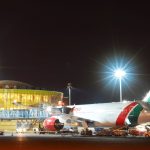
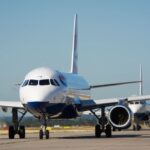
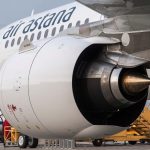

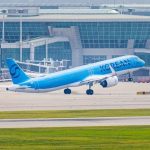



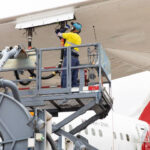

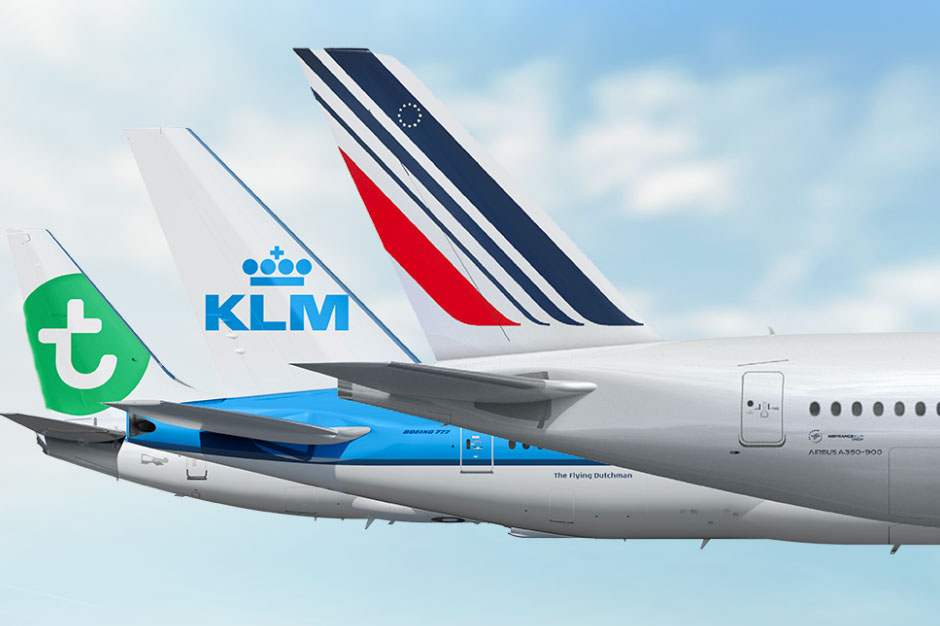

More News & Features
African Development Bank and Japanese industrialist unite to explore SAF production in Africa
LanzaJet and KMG agree to progress SAF production project in Kazakhstan
SkyNRG says e-SAF and carbon removals should not be competing strategies for aviation decarbonisation
South Korea announces mandatory SAF blending for departing international flights from 2027
Catagen launches SAF production company and signs offtakes with Ryanair and Shell
Australia announces A$1.1bn incentive scheme to drive local production of low carbon fuels including SAF